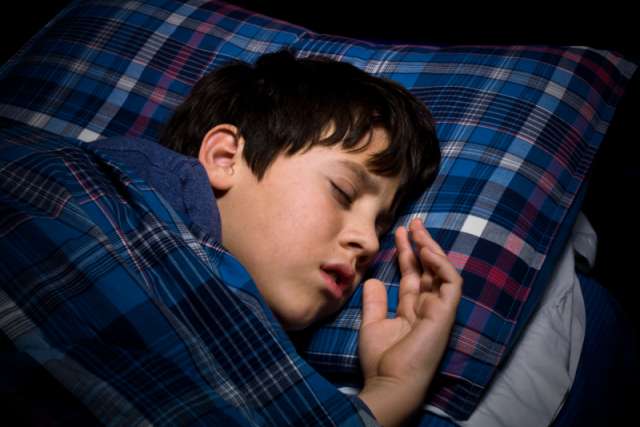Pediatric melatonin use is at record levels, as more parents turn to the easily available supplements to help with their kids’ sleep. But melatonin isn’t necessarily the right answer to solve pediatric sleep issues – especially without first trying other approaches.
In fact, there’s little evidence that melatonin supplements are effective in helping kids (or adults) fall asleep, noted Sam Kashani, MD, a sleep medicine specialist and assistant clinical professor at the David Geffen School of Medicine at UCLA.
How melatonin affects sleep
Melatonin, a hormone released each night by the pineal gland, prompts feelings of sleepiness.
“Our brain starts to release melatonin about three hours before the time that we naturally fall asleep,” Dr. Kashani explained. “The endogenous melatonin that our brain secretes is one of the two main modulators of our circadian rhythm, the other one being bright light exposure.” Together, these two cues, known as zeitgebers, regulate the sleep-wake cycle by promoting sleepiness or alertness, respectively.
While the timing of sleep (known as chronotype) slowly moves later as children grow, there’s a pronounced shift to a later sleep-wake schedule when they reach adolescence, as melatonin begins to be released later in the evening and subside later in the morning. This later sleep timing peaks at about age 20 and then gradually shifts a bit earlier.
Pediatric sleep scenarios when melatonin is warranted
In some adolescents, however, this sleep-wake timing may be on a much later schedule – at least two hours later than what would be a usual sleep-wake pattern (i.e., one that’s compatible with external demands such as getting to school or a job in the morning), Dr. Kashani explained. In this scenario, he said, taking melatonin three hours before the desired bedtime can actually advance the person’s circadian rhythm so they’re feeling sleepy and are able to fall asleep at a more reasonable hour.
The one scenario in which melatonin has proved useful as a sleep aid taken near bedtime is for children with autism spectrum disorder, Dr. Kashani said.
“Because of their behavioral patterns, some kids with autism spectrum disorder can have a really difficult time with sleep,” he explained. There have been some small studies showing that a low dose of melatonin can help them fall asleep more easily.
Finally, melatonin has been shown to be highly effective in treating REM Sleep Behavior Disorder, Dr. Kashani said, although it’s a condition that’s fairly rare in kids. “REM sleep behavior refers to somebody who acts their dreams out,” he explained. “So somebody has a nightmare that they’re in a fight, and they start swinging and punching while they’re in bed. In that situation, melatonin can actually reduce muscle activity during sleep, so that someone who may hurt themselves acting out their dreams will stop doing that.”
The appeal and pitfalls of melatonin
Melatonin, which is sold over the counter in the United States, is classified as a dietary supplement by the U.S. Food and Drug Administration and is not subject to the same requirements and testing as prescription medications. It’s also relatively inexpensive and commonly available as flavored gummies, making it appealing to kids.
However, the fact that melatonin gummy supplements can easily be mistaken as a snack or candy by young kids also can lead to unintentional overdoses. Between 2012 and 2021, there were more than 260,000 calls to U.S. poison control centers about kids who’d ingested melatonin, according to the Centers for Disease Control and Prevention. Of these, nearly 84% were for kids age 5 and younger.
Another concern: The amount of melatonin listed on the label is frequently inaccurate, as noted in a study published earlier this year in the Journal of the American Medical Association. After analyzing the actual ingredients in 25 different brands of melatonin gummies, the researchers found that 22 of them didn’t match what was listed on their labels, with most containing more melatonin (and in one case, more than three times as much) than what was listed.
Meanwhile, overall usage of melatonin has spiked in recent years. While this is generally attributed to the COVID-19 pandemic and increases in overall anxiety and sleep issues, it’s meant that more kids than ever are now taking melatonin.
According to a new study published in November in JAMA Pediatrics, about 19% of school-aged kids and pre-teens (ages 5 to 13) had taken melatonin within the past 30 days, as had more than 5% of preschoolers (ages 1 through 4). In many cases, melatonin was being used for an extended period of time, for a year or longer.
That’s despite the fact that using melatonin to help fall asleep “has very limited to no evidence,” Dr. Kashani said. There’s also very little data looking at long-term melatonin use, he pointed out, although it’s considered more benign than prescription sleep medications.
A better approach to help kids fall asleep
“Most young kids don’t require any medication or supplement to go to sleep,” Dr. Kashani said. Instead, he recommends behavioral strategies such as maintaining consistent bedtimes and implementing calming wind-down routines.
These types of strategies have been shown to be “very effective for younger kids with sleep problems,” Dr Kashani said, “whether it’s issues like sleep-onset associations, in which the child requires a specific item or setting in order to fall asleep, or inadequate parental limit setting, which is probably the most common cause of behavioral insomnia issues in children.”
Although he acknowledges the appeal of melatonin as an apparent quick fix, he recommends that parents first discuss other strategies with a sleep specialist.
“It’s always in both the parents’ and the child’s best interest to at least have a consultation” before turning to melatonin, he said. “Very often, parents may not know that certain behavioral strategies can be very effective in correcting their child’s sleep problem. Rather than go that route, they’ll just go get melatonin because it’s freely available over the counter.”
If parents do decide to give their kids melatonin, he recommends seeking medical guidance, as recommended dosages and timing will vary based on the child’s age and the specific circumstance.
“The bottom line is that I do not recommend melatonin as something to give to a child to ‘promote restful sleep’ – that’s not a good use of melatonin in the pediatric patient,” Dr. Kashani said. Instead, “melatonin should be used for the delayed-sleep-wake-phase child, or a child for whom behavioral strategies employed first to correct their nighttime sleep issues have failed.”




